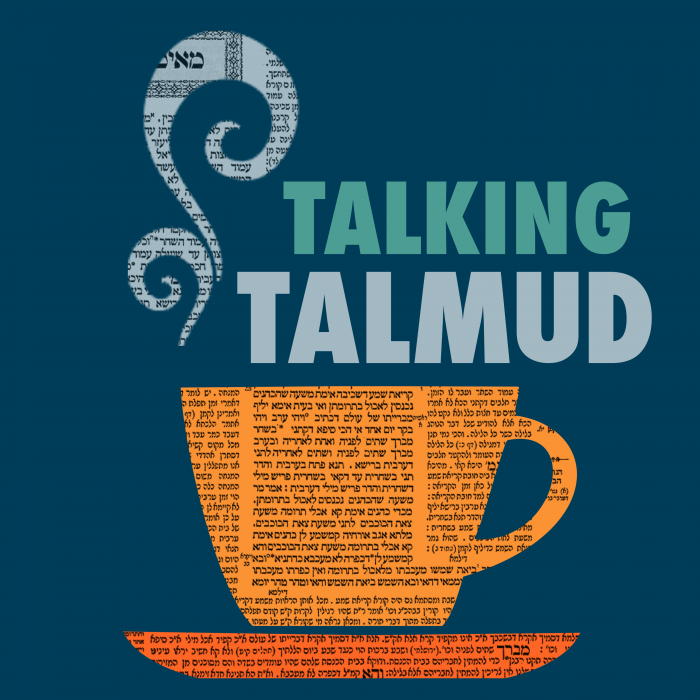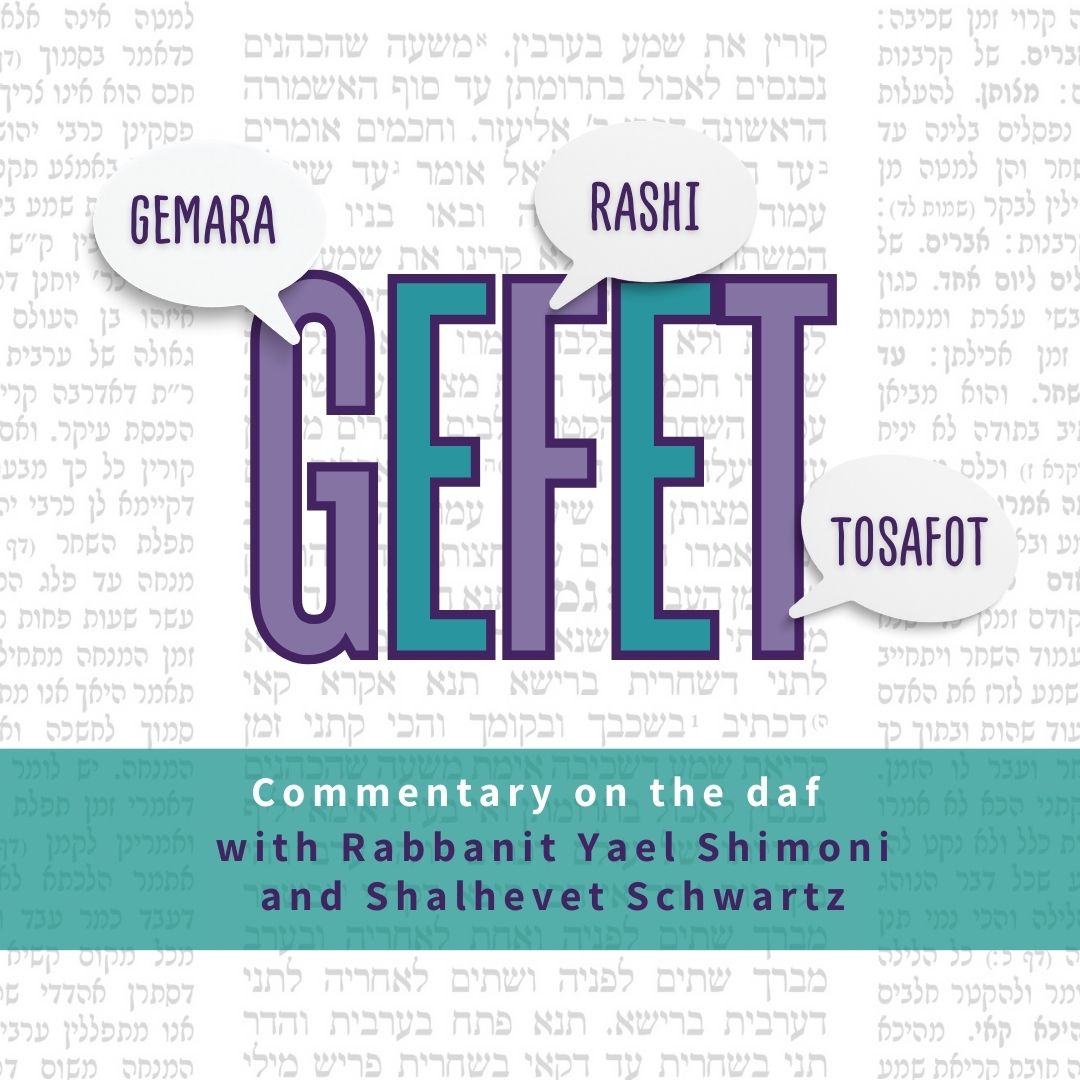Two people claimed they had each inherited a particular piece of land from their fathers. Rav Nachman ruled that the stronger one prevails. How is this case different from two people claiming ownership of an item by having a document of sale or gift issued on the same date where Rav and Shmuel disagree – one holds it is divided and the other that it is given to the judges’ discretion? How is it different from a case where a cow is traded for a donkey or a maidservant is sold and the cow/maidservant has offspring and it is unclear if the birth happened before or after the sale and the ruling is that the offspring is split between the two parties? In a case where the verdict is that the strongest one prevails, what happens if a third party comes and seizes the item? In what situations is presumptive status established immediately? Gentiles can only establish ownership with a document, not with a chazaka. Rav ruled that a Jew who claims that he/she bought property from a gentile, must prove it with a document.
Bava Batra
Masechet Bava Batra is sponsored by Lori Stark in loving memory of her mother in law, Sara Shapiro z”l and her father Nehemiah Sosewitz z”l.
This month’s learning is dedicated to the refuah shleima of our dear friend, Phyllis Hecht, גיטל פעשא בת מאשה רחל by all her many friends who love and admire her. Phyllis’ emuna, strength, and positivity are an inspiration.
Want to dedicate learning? Get started here:

Today’s daily daf tools:
Bava Batra
Masechet Bava Batra is sponsored by Lori Stark in loving memory of her mother in law, Sara Shapiro z”l and her father Nehemiah Sosewitz z”l.
This month’s learning is dedicated to the refuah shleima of our dear friend, Phyllis Hecht, גיטל פעשא בת מאשה רחל by all her many friends who love and admire her. Phyllis’ emuna, strength, and positivity are an inspiration.
Today’s daily daf tools:
Delve Deeper
Broaden your understanding of the topics on this daf with classes and podcasts from top women Talmud scholars.
New to Talmud?
Check out our resources designed to help you navigate a page of Talmud – and study at the pace, level and style that fits you.
The Hadran Women’s Tapestry
Meet the diverse women learning Gemara at Hadran and hear their stories.
Bava Batra 35
דְּרַב אָמַר: יַחְלוֹקוּ, וּשְׁמוּאֵל אָמַר: שׁוּדָא דְּדַיָּינֵי? הָתָם, לֵיכָּא לְמֵיקַם עֲלַהּ דְּמִילְּתָא; הָכָא, אִיכָּא לְמֵיקַם עֲלַהּ דְּמִילְּתָא.
as Rav said: In that case, they should divide the property between them, and Shmuel said: It is decided based on the discretion [shudda] of the judges. Why in the seemingly equivalent case of a dispute where there is no evidence for either litigant did Rav Naḥman rule that whoever is stronger prevails? The Gemara answers: There, in the case of the two deeds, it will not be possible for the court to clarify the matter in the future, and therefore, the court issues a ruling according to the information they currently have. Here, in the case of Rav Naḥman, it may be possible for the court to clarify the matter in the future, if one of the litigants was to bring witnesses supporting his claim.
וּמַאי שְׁנָא מֵהָא דִּתְנַן: הַמַּחֲלִיף פָּרָה בַּחֲמוֹר, וְיָלְדָה; וְכֵן הַמּוֹכֵר שִׁפְחָתוֹ, וְיָלְדָה – זֶה אוֹמֵר: ״עַד שֶׁלֹּא מָכַרְתִּי יָלְדָה״, וְזֶה אוֹמֵר: ״מִשֶּׁלָּקַחְתִּי יָלְדָה״ – יַחְלוֹקוּ?
The Gemara asks: And in what way is this case different from that which we learned in a mishna (Bava Metzia 100a): With regard to one who exchanges a cow for a donkey and the cow calved, and similarly one who sells his Canaanite maidservant and she gave birth, and this one, i.e., the seller, says: She gave birth before I sold either the cow or maidservant, and the offspring belongs to me; and that one, i.e., the buyer, says: She gave birth after I purchased her and the offspring belongs to me, the ruling is that they should divide the value of the newborn. In that case, the court is not able to clarify the matter, so they should rule that whoever is stronger prevails.
הָתָם, לְהַאי
The Gemara answers: There, in the case of the exchange, for this one, i.e., the buyer,
אִית לֵיהּ דְּרָרָא דְמָמוֹנָא, וּלְהָהוּא אִית לֵיהּ דְּרָרָא דְמָמוֹנָא; הָכָא, אִי דְּמָר – לָא דְּמָר, וְאִי דְּמָר – לָא דְּמָר.
he has financial involvement [derara], and for that one, i.e., the seller, he has financial involvement. Since each of them has a definite claim to owning the offspring, as each of them owned the cow or maidservant at one point, it is reasonable for the court to divide the offspring between the two parties. By contrast, here, in the case of Rav Naḥman, if it belongs to this Master it does not belong to that Master, and if it belongs to that Master it does not belong to this Master. Only one of the two litigants has any claim to the property, as it belonged either to the ancestors of this one or of that one. Therefore, a ruling to divide it would not be appropriate.
אָמְרִי נְהַרְדָּעֵי: אִם בָּא אֶחָד מִן הַשּׁוּק, וְהֶחְזִיק בָּהּ – אֵין מוֹצִיאִין אוֹתָהּ מִיָּדוֹ. דְּתָנֵי רַבִּי חִיָּיא: גַּזְלָן שֶׁל רַבִּים לָאו שְׁמֵיהּ גַּזְלָן.
The Sages of Neharde’a say: In a case where two parties disputed the ownership of a certain property and the court ruled that whoever is stronger prevails, if one from the marketplace who had no claim came and took possession of it, the court does not remove it from his possession, as Rabbi Ḥiyya teaches (Tosefta, Bava Kamma 10:14): A robber of the public, meaning a robber whose victim is unknown, is not called a robber. Since it is unclear whom he robbed, no one is able to demand payment. Here too, since it is unclear whose property it is, neither can demand that it be taken from the robber.
רַב אָשֵׁי אָמַר: לְעוֹלָם שְׁמֵיהּ גַּזְלָן, וּמַאי ״לָא שְׁמֵיהּ גַּזְלָן״? שֶׁלֹּא נִיתַּן לְהִשָּׁבוֹן.
Rav Ashi said in disagreement: Actually, he is called a robber, and the property is taken from him, and what is meant by: He is not called a robber? It means that the stolen item is not subject to being returned, and consequently he is unable to fully atone, as he does not know whom to repay.
חׇזְקָתָן שָׁלֹשׁ שָׁנִים מִיּוֹם לְיוֹם וְכוּ׳. אָמַר רַבִּי אַבָּא: אִי דָּלֵי לֵיהּ אִיהוּ גּוּפֵיהּ צַנָּא דְפֵירֵי, לְאַלְתַּר הָוֵי חֲזָקָה. אָמַר רַב זְבִיד, וְאִם טָעַן וְאָמַר: ״לְפֵירוֹת הוֹרַדְתִּיו״ – נֶאֱמָן. וְהָנֵי מִילֵּי בְּתוֹךְ שָׁלֹשׁ, אֲבָל לְאַחַר שָׁלֹשׁ – לָא.
§ The mishna teaches with regard to certain types of property that their presumptive ownership is established by use of a duration of three years from day to day. The Gemara comments: Rabbi Abba says: Nevertheless, there are cases where presumptive ownership is established immediately. For example, if the prior owner himself lifted a basket of fruit from that field for the possessor, that immediately is sufficient to establish the presumption of ownership, and the prior owner can no longer lodge a protest. Rav Zevid says: But if the prior owner stated a claim and said: I brought him down into my field solely to consume the produce, e.g., as a sharecropper, he is deemed credible. And that halakha, that the prior owner is deemed credible were he to state such a claim, applies only if he stated it within three years of when the other took possession, but after three years he is not deemed credible.
אֲמַר לֵיהּ רַב אָשֵׁי לְרַב כָּהֲנָא: אִי לְפִירָא אַחֲתֵיהּ, מַאי הֲוָה לֵיהּ לְמֶעְבַּד? אֲמַר לֵיהּ: אִיבְּעִי לֵיהּ לְמַחוֹיֵי.
Rav Ashi said to Rav Kahana: If in fact he did bring him down into the field solely to consume the produce, what was there for him to do to prevent the possessor from establishing the presumption of ownership? Rav Kahana said to him: He should have protested during the first three years and publicized that he had granted the possessor rights to the produce alone.
דְּאִי לָא תֵּימָא הָכִי, הָנֵי מַשְׁכְּנָתָא דְסוּרָא, דִּכְתִב בְּהוּ: ״בְּמִשְׁלַם שְׁנַיָּא אִלֵּין תִּיפּוֹק אַרְעָא דָּא בְּלָא כְּסַף״; אִי כָּבֵישׁ לֵיהּ לִשְׁטַר מַשְׁכַּנְתָּא גַּבֵּיהּ, וְאָמַר: לְקוּחָה הִיא בְּיָדִי, הָכִי נָמֵי דִּמְהֵימַן? מְתַקְּנִי רַבָּנַן מִידֵּי דְּאָתֵי בֵּיהּ לִידֵי פְּסֵידָא?! אֶלָּא אִיבְּעִי לֵיהּ לְמַחוֹיֵי; הָכָא נָמֵי, אִיבְּעִי לֵיהּ לְמַחוֹיֵי.
The assumption that lodging a protest would be effective must be correct, since if you do not say so, then in the case of this mortgage according to the custom in Sura, a city in Babylonia, in which is written: At the completion of these years this land will be released to its prior owner without any need for the prior owner to give money, if the creditor were to hide the mortgage document in his possession and say: This land is purchased and that is why it is in my possession, here is it also the case that he would be deemed credible? That cannot be, as is it reasonable that the Sages would institute a matter, such as this type of arrangement, that people can be led by it to suffer a loss? Rather, in the case of the mortgage the debtor should have protested, and by not protesting, he causes his own loss. Here, too, in the case of the field, the owner should have protested.
אָמַר רַב יְהוּדָה אָמַר רַב: יִשְׂרָאֵל הַבָּא מֵחֲמַת גּוֹי – הֲרֵי הוּא כְּגוֹי; מָה גּוֹי – אֵין לוֹ חֲזָקָה אֶלָּא בִּשְׁטָר, אַף יִשְׂרָאֵל הַבָּא מֵחֲמַת גּוֹי – אֵין לוֹ חֲזָקָה אֶלָּא בִּשְׁטָר. אָמַר רָבָא, וְאִי אָמַר יִשְׂרָאֵל:
§ Rav Yehuda says that Rav says: With regard to a Jew who comes to claim land due to having received it from a gentile, he is like a gentile in terms of which legal claims are available to him. Therefore, just as a gentile has the ability to establish the presumption of ownership only by means of a document, so too, a Jew who comes to claim land due to having received it from a gentile has the ability to establish the presumption of ownership only by means of a document. Rava said: And if the Jew said to a prior owner, who claims to still own the land:






















